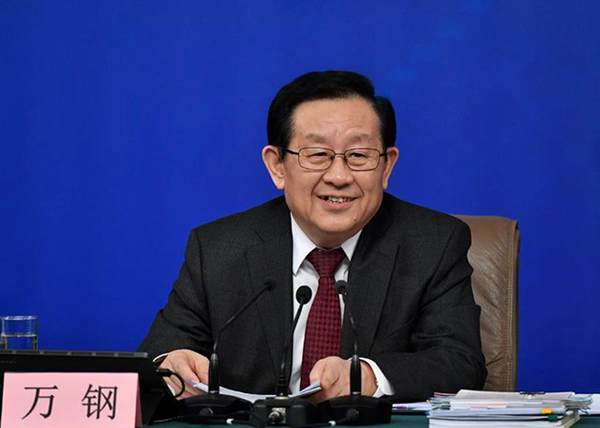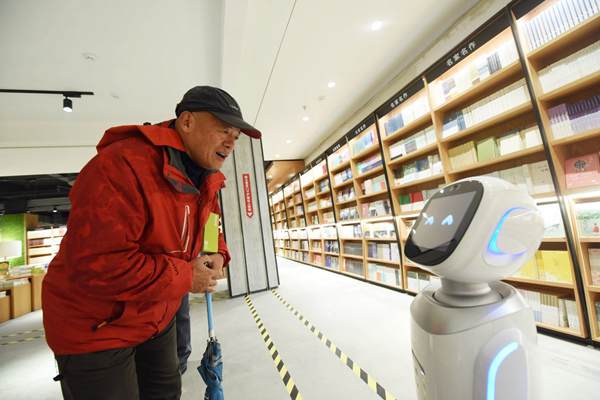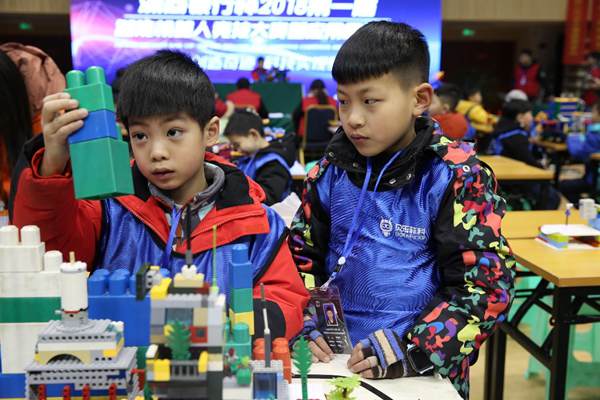

China will accelerate the application of artificial intelligence (AI) technologies in wider fields by constructing open-source platforms, Minister of Science and Technology Wan Gang told a press conference on Saturday.

Minister of Science and Technology Wan Gang answers questions at a press conference on the sidelines of the first session of the 13th National People's Congress in Beijing, capital of China, on March 10. (Photo by People’s Daily Online)
AI technologies will be used countrywide to boost industrial development and solve security, health, environment and other issues of public concern, Wan said at the press conference held on the sidelines of the first session of the 13th National People's Congress (NPC) on March 10th .
Research into key technologies guarantees the utilization of AI in more sectors, the minister said, adding that easy access for innovators, entrepreneurs and startups to the technology is important as well.
“In a bid to realize the goal, the first thing we will do is to build open-source platforms,” Wan said, citing Baidu, Alibaba, Tencent and other domestic high-tech pioneers as examples.
Chinese internet giant Baidu is working on driverless technology while e-commerce leader Alibaba researches intelligent transport and City Brain. Tencent is working on medical imaging technology and information technology company iFlytek is focused on voice recognition.

A visitor interacts with an AI robot at a bookstore in Hangzhou, East China’s Zhejiang Province on December 15. (Photo: CFP)
Facial recognition technologies have been applied in high-speed railway stations and airports step by step, the minister said.
“We must make such sources open so that the technologies can play a role in economic and social development,” he said.
Stressing that technological advancement always generates social impact, the minister noted that laws and regulations have to be updated to address possible challenges in social ethics, employment structure, personal privacy and national security brought about by AI technologies.

Pupils buy drinks from a robot salesman at a science and technology museum in North China's Tianjin on February 25. (Photo: CFP)
Last July, the State Council issued a plan on new generation AI. The roadmap prizes to in-depth integration of AI technologies with economic and social development. It said the AI industry should be a major growth engine and improve people's lives by 2020. The plan also set a target for China to become a leading center for global AI innovation by 2030.

Players compete with AI robots at Chongqing University of Science and Technology in Southwest China on January 28. (Photo: CFP)
 Fire brigade in Shanghai holds group wedding
Fire brigade in Shanghai holds group wedding Tourists enjoy ice sculptures in Datan Town, north China
Tourists enjoy ice sculptures in Datan Town, north China Sunset scenery of Dayan Pagoda in Xi'an
Sunset scenery of Dayan Pagoda in Xi'an Tourists have fun at scenic spot in Nanlong Town, NW China
Tourists have fun at scenic spot in Nanlong Town, NW China Harbin attracts tourists by making best use of ice in winter
Harbin attracts tourists by making best use of ice in winter In pics: FIS Alpine Ski Women's World Cup Slalom
In pics: FIS Alpine Ski Women's World Cup Slalom Black-necked cranes rest at reservoir in Lhunzhub County, Lhasa
Black-necked cranes rest at reservoir in Lhunzhub County, Lhasa China's FAST telescope will be available to foreign scientists in April
China's FAST telescope will be available to foreign scientists in April "She power" plays indispensable role in poverty alleviation
"She power" plays indispensable role in poverty alleviation Top 10 world news events of People's Daily in 2020
Top 10 world news events of People's Daily in 2020 Top 10 China news events of People's Daily in 2020
Top 10 China news events of People's Daily in 2020 Top 10 media buzzwords of 2020
Top 10 media buzzwords of 2020 Year-ender:10 major tourism stories of 2020
Year-ender:10 major tourism stories of 2020 No interference in Venezuelan issues
No interference in Venezuelan issues
 Biz prepares for trade spat
Biz prepares for trade spat
 Broadcasting Continent
Broadcasting Continent Australia wins Chinese CEOs as US loses
Australia wins Chinese CEOs as US loses